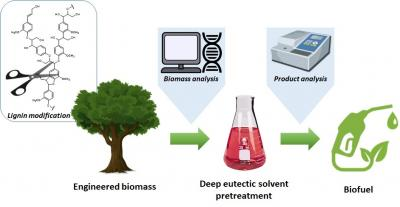Mar 2 2020
Biofuel is generally considered as a clean fuel. However, its major disadvantage is that it is synthesized from food sources. Constant studies have looked into solving this issue by using lignocellulosic biomass to create second-generation biofuels.
 The researchers were able to maximize and combine the potential of several different fields for Biofuel Production, including genetic engineering, process technology, and analysis technology. Image Credit: Korea Institute of Science and Technology (KIST).
The researchers were able to maximize and combine the potential of several different fields for Biofuel Production, including genetic engineering, process technology, and analysis technology. Image Credit: Korea Institute of Science and Technology (KIST).
An effective biofuel production technique was recently developed at the Korea Institute of Science and Technology (KIST, President Lee Byung-Gwon) through the KIST-UBC (University of British Colombia) lab program in Vancouver, Canada. The technique takes advantage of the genetic engineering of bio-derived deep eutectic solvents (DESs) and lignin.
Nearly 20% to 30% of lignocellulosic biomass is formed of lignin, which affects the biofuel production. Therefore, it is often separated and eliminated or simply burned. It is highly crucial to efficiently remove and valorize lignin to ensure the economic viability and commercialization of second-generation biofuels.
Researchers at the Joint BioEnergy Institute developed a lignin genetic engineering with the potential to isolate lignin more effectively. They employed this new technology to modify a part of lignin’s structure and make it shorter, which necessitates only a small amount of chemicals or energy to eliminate the lignin.
Later, they added a bio-derived DES, created by Dr Kwang Ho Kim, to this technique. Lastly, they employed an analysis technique devised by UBC to complete the biofuel production process and ensure the economic viability of the process.
Developing the technology and its associated processes required an extensive array of skills and knowledge in biology, chemical engineering, and analytical chemistry. In the last few years, researchers have performed various different types of biofuel research in many different fields. But only a few studies have been conducted to link the various research works with their resulting technologies.
To overcome this problem, Dr Kwang Ho Kim from KIST put forward and performed joint research with the University of British Columbia in Canada and the State University of New York (College of Environmental Science and Forestry) in the United States. Through the collaboration, the researchers could maximize and merge the potential of various fields, such as genetic engineering, analysis technology, and process technology.
This research has produced results by maximizing the core competencies of each field represented by the participating Korean, U.S., and Canadian researchers in a bid to address an international agenda—namely, the development of climate change response technology.
Dr Kwang Ho Kim, Researcher, Korea Institute of Science and Technology
Dr Kim continued, “We will continue to develop Korea’s fundamental technology and tackle climate change and global warming by playing a leading role in the convergence research we are conducting in collaboration with the outstanding research teams based in North America, to develop a sustainable bioenergy production technology.”